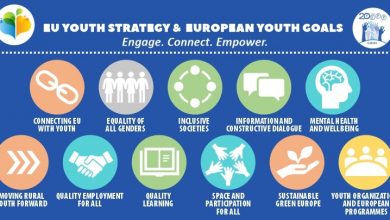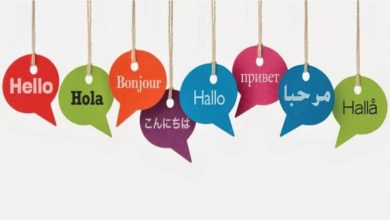Human Right Mixer – what do I know about human rights?
The objective of this tool is to reveal what learners already know about human rights. You can use it for your own personal reflection or you can use it for a group of learners. The explanation below follows as you would be using it in group work. It is a good icebreaker for learners to get to know each other with a human rights perspective. Or it can be used at the beginning of training on human rights to assess the knowledge of the learners about human rights and add knowledge of the missing gaps.

Imagine you have a group of learners coming from different countries. The procedure of this exercise would be:
- Explain.
Explain that learners will be working closely together, so they must get to know one another. This icebreaker will help them get acquainted using a human rights perspective.
- Distribute.
Distribute a copy of Handout: Human Rights Mixer to each participant and review the instructions. The activity aims to get an answer from a different person for each square. Indicate that they will have 5 minutes to complete as many squares as possible. As an incentive, you can have a prize of some kind for whoever gets the most responses in 5 minutes.
- Mix It Up.
Start your timer and ask the participants to start the game. When five minutes have elapsed, instruct the participants to stop.
- Share.
Ask the person who completed the most squares to share some of his/her responses with the group. Ask participants to return to their seats and briefly introduce themselves to their neighbours.
Human Rights Mixer HANDOUT
Instructions: Using members of the group as sources of information, fill in an answer for as many squares as you can. Each answer should come from a different person.
| A human right | A way that we affect the human rights situation in other countries | A document that proclaims human rights | A group in our country that wants to deny rights to others | Something you can do to uphold human rights in your daily life |
| An organization which fights for human rights in your community | A human rights issues that you’ve worked on | A group in your community whose rights are denied | A right that is absent in your country, but exists in another country. | A human right that is important to you right now |
| Recent event or action that improved the human rights in this country | An example of human rights violation that disturbs you
the most |
A right that sometimes is denied to women in your country | A right fulfilled in your country that is not always fulfilled in other countries | A movement in our country that has advanced human rights |
| A right that is denied to some people in your community | A right of yours that is respected | One word that describes why you do social/youth work | Book, movie or song about human rights | Someone who is defender of human rights |
Why did I choose this tool?
This is a good exercise for learners to break the ice and get to know each other from a human rights perspective. It can also be used as an introduction of a bigger session on human rights and this could be the beginning to assess the knowledge of the group. The knowledge that can be added on this session can be derived from the article Human Rights Basics.
Reflection questions
Exercise:
What Does It Mean to Be Human?
- Write the words “HUMAN” and “RIGHTS” at the top of chart paper or a blackboard. Below the word “human” draw a circle or the outline of a human being.
2. Ask learners to brainstorm what qualities define a human being and write the words or symbols inside the outline. For example, “intelligence,” “sympathy.”
- Next ask learners what they think is needed in order to protect, enhance, and fully develop these qualities of a human being. List their answers outside the circle, and ask participants to explain them. For example, “education,” “friendship,” “loving family.” (Note: Save this list for use in Part B)
- Discuss:
– What does it mean to be fully human? How is that different from just “being alive” or “surviving”?
Based on this list, what do people need to live in dignity?
- Are all human beings essentially equal? What is the value of human differences?
- Can any of our “essential” human qualities be taken from us? For example, only human beings can communicate with complex language; are you human if you lose the power of speech?
- What happens when a person or government attempts to deprive someone of something that is necessary to human dignity?
- What would happen if you had to give up one of these human necessities?
The rights of every man are diminished when the rights of one man are threatened.
― John F. Kennedy
Everyone has the right to freedom of opinion and expression; this right includes freedom to hold opinions without interference and to seek, receive and impart information and ideas through any media and regardless of frontiers.
― United Nations, Universal Declaration of Human Rights




